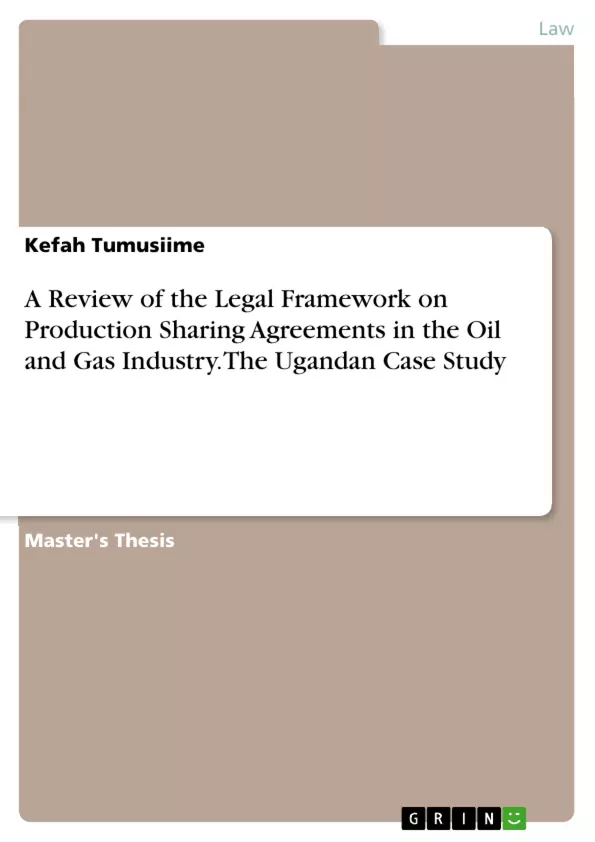This research paper analyses the existing laws and regulatory frameworks in the oil and gas sector with a particular focus on Uganda’s oil and gas industry. This research analyses the background of the country’s oil and gas industry with specific reference to the adaptation of the Production sharing agreement (PSA) model in as far as oil and gas contracts are concerned.
The research commences by undertaking an in depth analysis of the basic laws, regulatory, policy and institutional frameworks concerning the management and administration of the oil and gas sector. The research then focuses on the legal framework on the PSA model pertaining to the ownership of the resources, the issuing of licenses and concessions, in as well as efforts undertaken to safeguard the effects of signing PSAs on aspects of environmental protection. This research is also designed to critically analyse the weaknesses and strengths of the current legal regime as well as identifying the gaps in laws relating to the applicability of PSAs and measures being taken to tackle such gaps in the regulatory framework of the country and exploring the ways in which aspects of transparency and effective management of the oil and gas industry are concerned. The research paper also discusses if other factors such as the different stakeholders like media houses, civil societies, Non-governmental organisations and International Oil and gas companies have a had a role to play in influencing the PSA model as the most appropriate choice of the Ugandan oil and gas contracts.
Conclusively the research puts forward recommendations regarding how the gaps in the legal framework on the PSA model should integrate or regulate the identifiable influences of other stakeholders in Uganda’s oil and gas industry.
Inhaltsverzeichnis (Table of Contents)
- CHAPTER ONE: INTRODUCTION AND BACKGROUND
- Introduction
- Background of Uganda's oil and gas industry.
- Statement of the Problem
- Purpose/Significance
- Objectives of the study
- Research Questions
- Scope of the Study
- Chapter synopsis
- CHAPTER TWO: LITERATURE REVIEW
- Introduction
- Summary of Literature Review
- Overview of PSAs in other African countries: NIGERIA
- Challenges of relying on PSAs as a contractual regime in the oil and gas sector
- Conclusion
- CHAPTER THREE: RESEARCH METHODOLOGY
- Legal Context and Research Setting.
- Research Design
- Area of Study
- Research Method
- Sample and Sampling Techniques
- Data Collection Strategy/Methods
- Documentary Review
- Data Analysis Plan
- Case study approach
- Ethical Considerations
- Conclusion
- CHAPTER FOUR: RESULTS AND ANALYSIS
- Introduction
- Recap of research objectives
- Synchronizing Primary and Secondary findings
- The legal frameworks on PSAs in Uganda's oil and gas industry.
- The Constitution of the Republic of Uganda, 1995
- The Petroleum (Exploration, Development and Production) Act, 2013 (the Upstream Act)
- Conclusion
Zielsetzung und Themenschwerpunkte (Objectives and Key Themes)
This dissertation examines the legal framework surrounding production sharing agreements (PSAs) in Uganda's oil and gas industry. It aims to analyze the legal framework for PSAs, identify key challenges, and offer recommendations for improvement. The research utilizes a case study approach, focusing on the Ugandan context.
- Legal framework for PSAs in Uganda's oil and gas industry
- Challenges of relying on PSAs as a contractual regime in the oil and gas sector
- The role of the Petroleum (Exploration, Development and Production) Act, 2013
- Comparative analysis of PSAs in other African countries, particularly Nigeria
- Recommendations for improving the legal framework for PSAs in Uganda
Zusammenfassung der Kapitel (Chapter Summaries)
The first chapter provides an introduction to the study, outlining its background, purpose, objectives, research questions, and scope. Chapter Two delves into the literature review, exploring existing research on PSAs in the oil and gas industry, particularly within an African context. It examines the challenges associated with relying on PSAs as a contractual regime. Chapter Three presents the research methodology employed, outlining the legal context, research design, data collection methods, and ethical considerations. Chapter Four presents the results and analysis of the study, drawing on both primary and secondary data sources to assess the legal framework for PSAs in Uganda's oil and gas industry.
Schlüsselwörter (Keywords)
The primary focus of this dissertation is the legal framework of production sharing agreements (PSAs) in Uganda's oil and gas industry. Key concepts explored include the Petroleum (Exploration, Development and Production) Act, 2013, the Constitution of the Republic of Uganda, 1995, and the challenges and benefits of PSAs as a contractual regime. This research also examines the experience of other African countries, particularly Nigeria, in utilizing PSAs within the oil and gas sector.
Frequently Asked Questions
What is a Production Sharing Agreement (PSA)?
A PSA is a contract between a government and a resource company that outlines how much of the extracted oil or gas each party will receive.
What is the legal framework for oil in Uganda?
Key laws include the 1995 Constitution and the Petroleum (Exploration, Development and Production) Act of 2013, also known as the Upstream Act.
What challenges does Uganda face in its oil sector?
Challenges include gaps in regulatory frameworks, environmental protection concerns, and the need for greater transparency in contract management.
How do stakeholders influence the PSA model in Uganda?
Media, civil society, and NGOs play a role in advocating for transparency and influencing the choice of contractual regimes in the industry.
Why is Nigeria used as a comparison in this research?
Nigeria provides a relevant African case study for the long-term impacts and challenges of relying on PSAs within a large-scale oil and gas sector.
- Quote paper
- Kefah Tumusiime (Author), 2021, A Review of the Legal Framework on Production Sharing Agreements in the Oil and Gas Industry. The Ugandan Case Study, Munich, GRIN Verlag, https://www.grin.com/document/1001707



